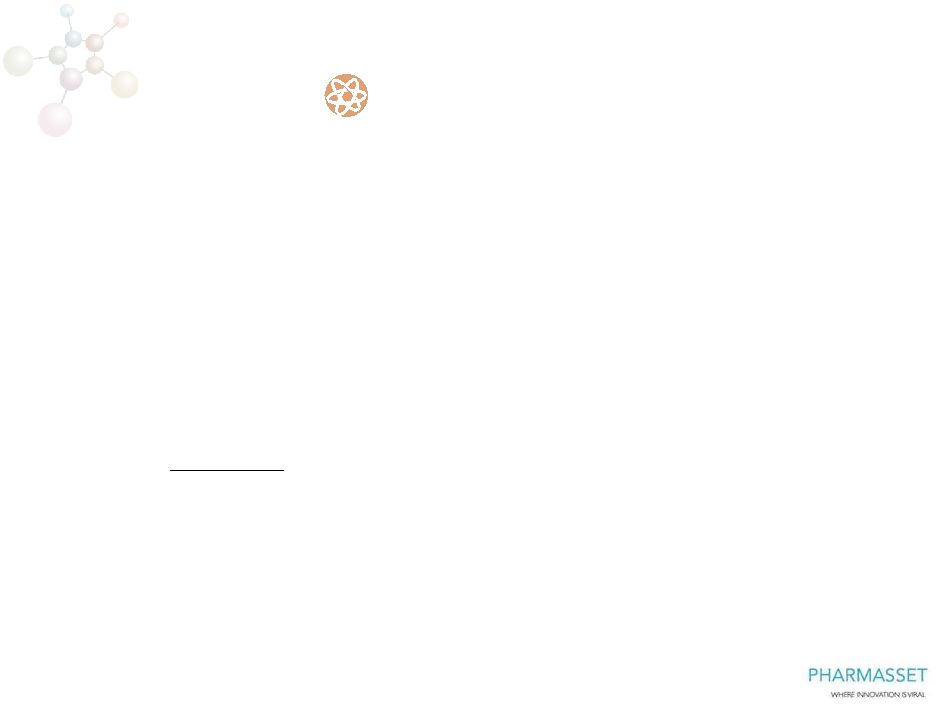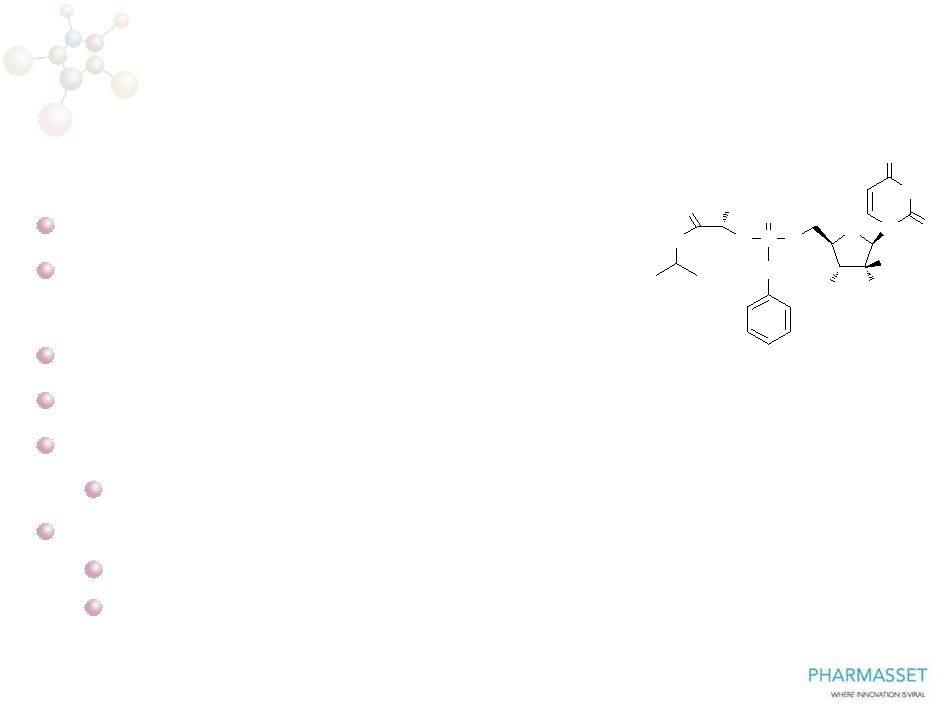Attached files
| file | filename |
|---|---|
| 8-K - FORM 8-K - Pharmasset Inc | d8k.htm |
 PSI-7977 QD with PEG/RBV:
12-week Safety, RVR, cEVR, & SVR12 in
Treatment-naïve Patients with HCV GT2 or GT3
J Lalezari, E Lawitz, M Rodriguez-Torres, A Sheikh,
B Freilich, DR Nelson, T Hassanein, M Mader,
R Hyland, E Albanis, WT Symonds, MM Berrey
PROTON
Exhibit 99.1 |
 Financial Disclosures
HCV Grant support from:
Achillion
BI
BMS
Idenix
Pfizer
Pharmasset, Inc
Presidio
Scynexis
Vertex |
 PSI-7977 is a Potent and Specific
Nucleotide Analog Polymerase Inhibitor for HCV
Once-daily, broad HCV genotype coverage
Excellent antiviral activity
–
93-98% RVR in GT1, GT2 or 3
No virologic breakthrough through 12 weeks
Generally safe and well-tolerated in clinical studies to date
NUCLEAR:
400mg
QD
monotherapy
~4.7
log
10
decline
at
day
7
(LB
#1370)
PROTON:
200mg & 400mg QD + PEG/RBV in HCV GT 1 (LB #1372)
400mg QD + PEG/RBV in HCV GT2 or GT3
PSI-7977
PSI-7977
O
C
H3
F
HO
O
N
NH
O
O
P
O
O
N
H
O
O
CH3 |
 Current Therapy for HCV GT2 and GT3 is
Complex and Suboptimal for Many Patients
SVR in HCV GT2: 72-82%
IFN-based regimens
–
16-24 wks of PEG/RBV; 24-48 wks for high VL, advanced fibrosis
–
HCV GT, race/ethnicity, BMI, age, HCV RNA, IL28B can increase
failure rates
–
Relapse rates remain significant and difficult to predict
Few promising DAA options in development
–
Protease inhibitors (PIs) and non-nucleoside polymerase
inhibitors (NNI) are limited by low homology of viral enzymes
–
Nucleotide analogs are chain terminators
Yields consistent antiviral responses across genotypes
References: Shiffman NEJM
2007; Mangia NEJM 2005; de Leuw Liver Intl 2011
SVR in HCV GT3: 50-71% |
 Hypothesis
HCV GT2 or GT3 can be cured with shorter
duration of IFN by adding a potent
nucleotide analog, PSI-7977, to PEG/RBV |
 Study
Design PROTON
125 treatment-naïve patients with HCV GT1
Planned 12 Week Interim analysis: Nelson, et al. EASL LB poster #1372
Week 0
12
48
72
24
SVR
Follow-Up
STOP
STOP
N=50
N=50
N=25
HCV GT1
25 treatment-naïve patients with HCV GT2/3
N=25
Week 0
12
HCV GT2/GT3
SVR24
SVR12
PSI-7977 200 mg QD
Peg-IFN + RBV
Peg-IFN + RBV
Non-RVR Peg-IFN + RBV
Non-RVR Peg-IFN + RBV
Peg-IFN + RBV
PSI-7977 400 mg QD
Peg-IFN + RBV
Peg-IFN + RBV
PSI-7977 400 mg QD
Peg-IFN + RBV |
 Study Population:
–
Treatment-naïve, non-cirrhotic
–
HCV RNA
>50,000
(4.7
log
10
)
IU/mL
25 subjects enrolled across 7 US sites
Study design:
–
Open-label PSI-7977 400mg + PEG/RBV x 12 weeks
–
Ribavirin 800-1200 mg per day
–
12 week treatment, not response-guided
Week 0
12
Study Design:
HCV GT2/3
PSI-7977 400 mg QD
PEG/ RBV
SVR12
SVR24 |
 GT2
n=15
GT3
n=10
Overall
n=25
Median HCV RNA
(log
IU/mL)
6.4
5.6
6.1
Gender (M/F)
8/7
8/2
16/9
Median Age (yrs)
51
41
47
Mean BMI
29.8
26.2
28.3
IL28B
(CC
v
T
allele)
4
/ 11
3
/ 8
7 / 18
(28%)
PROTON
HCV GT2/3:
Baseline Demographics
10 |
 Week 2
Week 4
RVR
Week 12
cEVR/EOT
SVR12
n
(evaluable)
24
24
24
24
HCV RNA < LOD*
21
24
24
24
% Response
88%
100%
100%
100%
Lost to follow-up
1
1
1
1
% Response (ITT)
84%
96%
96%
96%
PROTON HCV GT2/GT3
Antiviral Responses
24/25 enrolled subjects completed therapy
–
One subject lost to follow-up after day 1
Consistent HCV RNA reduction: 24/24 RVR & cEVR/EOT
–
No difference in viral kinetics: GT 2 v GT 3; IL28B CC v T allele
No virologic breakthrough; no post-therapy relapse through 12 wks
SVR12 in 24/24 subjects with evaluable data
*Roche COBAS TaqMan, LOD 15 IU/mL |
 Not possible to analyze impact of BL predictors of
response with 100% RVR and 100% SVR12 in all 24
evaluable subjects
An analysis of time to HCV RNA <LOD
with BL
predictors of negative response to IFN was conducted
–
HCV GT, age, gender, IL28B, baseline HCV RNA, BMI
No meaningful correlation with time to achieve HCV
RNA <LOD was observed
–
BMI >30 had OR 0.92 (95% CI 0.8, 0.98) correlated with
increased time to HCV RNA <LOD, but not RVR or SVR12
PROTON HCV GT2/GT3
Predictors of Response |
 Single subject with multiple baseline
predictors of negative response
PSI-7977/PEG/RBV
Post-treatment Follow-up
32 yo Hispanic female, IL28B T/T (rs12979860), hx obesity with
current BMI 29,
HCV RNA
0
1
2
3
4
5
6
7
0
4
8
12
16
20
24
Weeks |
 Adverse Event
GT 1
Placebo
PEG/RBV
n=26
n (%)
GT 1
PSI-7977
200 mg
n=48
n (%)
GT 1
PSI-7977
400 mg
n=47
n (%)
GT 2/3
PSI-7977
400 mg
n=24
n (%)
Nausea
2 (8)
1 (2)
3 (6)
1 (4)
Chills
3 (12)
2 (4)
2 (4)
1 (4)
Fatigue
6 (23)
5 (10)
6 (13)
0
Pain
2 (8)
3 (6)
3 (6)
1 (4)
Hypertension
0
0
1 (2)
3 (12)
Back Pain
3 (12)
0
0
0
Anxiety
0
1 (2)
3 (6)
0
Depression
2 (8)
1 (2)
2 (8)
1 (4)
Insomnia
2 (8)
2 (4)
7 (15)
1 (4)
Headache
6 (23)
2 (4)
3 (6)
0
Paraesthesia
0
0
0
2 (8)
No SAEs in GT2/3 cohort, No discontinuations related to PSI-7977
PROTON
Adverse
Events
>5%
(>moderate
intensity) |
 PSI-7977
Phase
2b
PROTON:
Treatment-emergent
Grade
3-4
lab
abnormalities
GT 1
Placebo
PEG/RBV
n=26
n (%)
GT 1
PSI-7977
200 mg
n=48
n (%)
GT 1
PSI-7977
400 mg
n=47
n (%)
GT 2/3
PSI-7977
400 mg
n=24
n (%)
Hgb
G3
G4
15 (57)
0
8 (17)
0
4 (9)
0
3 (13)
0
ANC
G3
G4
11 (42)
1 (4)
14 (29)
1 (2)
6 (13)
0
2 (8)
0
Lymph
G3
G4
2 (8)
2 (8)
2 (4)
0
1 (2)
0
0
1 (4)
PLT
G3/4
0
0
0
0
ALT
G3/4
0
0
0
0
AST
G3
G4
0
0
2 (4)
0
0
0
0
0
D bili
G3/4
0
0
0
0
Hepatic: Rapid decrease in ALT
Renal: No signal in serum creatinine or urine protein:creatinine
Cardiac: No treatment emergent changes in ECGs |
 PROTON:
Conclusions
In 25 treatment-naïve patients with HCV GT2 and GT3,
PSI-7977 400mg QD + PEG/RBV x 12 weeks:
–
96% RVR
-
96% cEVR/EOT
-
96% SVR12 (ITT)
SVR12 independent of traditional predictors of response
–
IFN-sparing
trial
ELECTRON
ongoing
No virologic breakthrough or relapse through SVR12
–
high barrier to resistance
Well-tolerated with no PSI-7977-related discontinuations
Consistent antiviral activity across HCV GT1, 2, 3
–
PROTON HCV GT1 RVR 98%, cEVR 96%
(Nelson, et al. EASL Late Breaker Poster #1372)
Favorable risk:benefit supports studies in patients with
advanced disease and broad HCV genotype distribution
|
 Acknowledgements
Patients & their families
Investigators and Staff at participating centers:
J Lalezari: Quest Clinical Research, San Francisco, CA
E Lawitz: Alamo Medical Research, San Antonio, TX
M Rodriguez-Torres: Fundacion de Investigacion, San Juan, PR
A Sheikh: GI Specialists of GA, Marietta, GA
B Freilich: Kansas City Gastroenterology, KS
DR Nelson: UFL, Gainesville, FL
T Hassanein: UCSD, San Diego, CA
Study Team at Pharmasset, Inc.
Cenetron
DCRI
Pharstat, Inc. |
